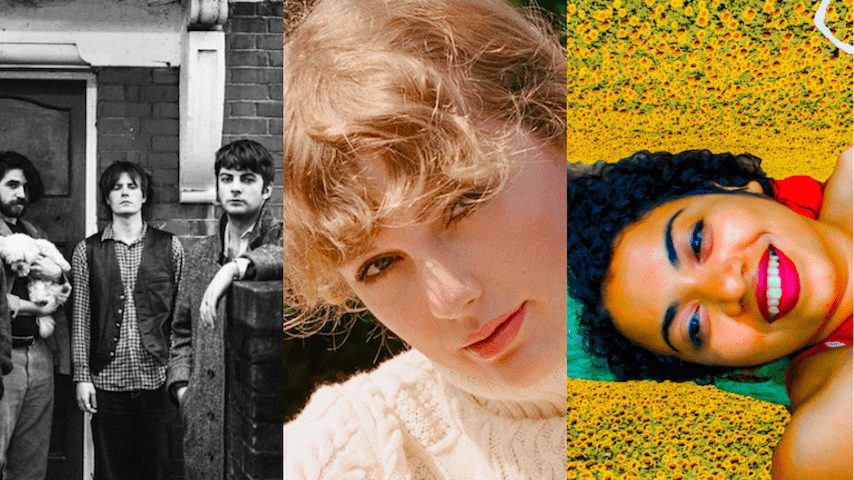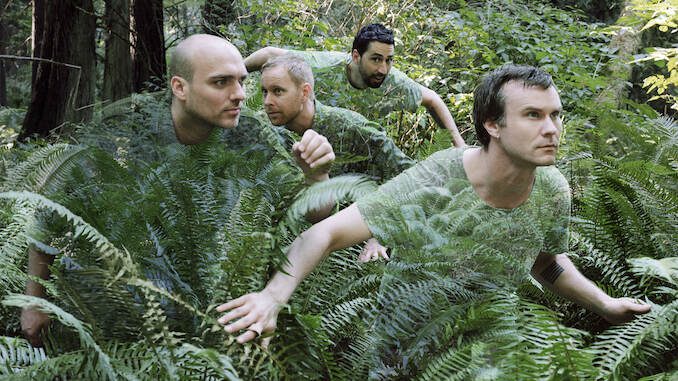It hasn’t been a traditional summer, but there’s been no shortage of invigorating and calming albums this July. Illuminati Hotties and Protomartyr screamed in our faces, and artists like The Beths and Lianne La Havas stripped things back and took us on our worthwhile tour of our emotions. With five New Music Fridays in July, it’s going to be hard to compete with the haul we received this month. Scroll down for 10 of our favorite albums from July.
10. Courtney Marie Andrews: Old Flowers
At the time of May Your Kindness Remain’s release, Andrews already had three excellent records under her worn leather belt. But this call for compassion solidified her as a lyricist with more empathy than she knew what to do with. On Andrews’ new album Old Flowers, that benevolence is abundant yet again, even though she wrote it following the messy disintegration of a nine-year relationship. While it occasionally loses itself in the past, Old Flowers doesn’t rely solely on nostalgia for its power. Andrews never wallows. She is somehow able to be both full of regret and gratitude at the same time. But Andrews is singular because she’s unafraid to look back on past loves with ample forgiveness. Old Flowers might make you cry, but it’s also an eloquent reminder that grace is always possible. —Ellen Johnson
9. The Beths: Jump Rope Gazers
The opening track on The Beths’ sophomore record, Jump Rope Gazers, sounds like a blunt apology from frontwoman Elizabeth Stokes to her listeners: “I’m not getting excited,” she trills over the buzz of up-tempo, cheerful guitar riffs and snappy drumming, “‘Cause the thrill isn’t mine to invite in.” But if it isn’t hers, whose is it? “I’m Not Getting Excited” sets Jump Rope Gazers off on the right note, a tone expected from The Beths’ excellent 2018 debut Future Me Hates Me, before segueing into “Dying to Believe,” another bracing, similarly chirpy pop rock song. Maybe Stokes is apologizing for good reason. Not that Jump Rope Gazers departs altogether from the zippy introductory one-two salvo Stokes launches with cohorts Jonathan Pearce, Benjamin Sinclair and Tristan Deck to kick the album off: The Beths return to that tenor as they go deeper into the tracklisting, picking it back up with “Mars, the God of War.” But as a follow-up to Future Me Hates Me, Jump Rope Gazers reads as introspective verging frequently on melancholic. —Andy Crump
8. Illuminati Hotties: FREE I??.H.: This Is Not The One You’ve Been Waiting For
Earlier this month, artists like Lucy Dacus, PUP and Sadie Dupuis of Speedy Ortiz shared a SoundCloud link to a self-titled album by a band called Occult Classic. With a solid black album cover and no credits to be found, buzz about the album started to swirl on social media—though that probably wouldn’t have happened if the album wasn’t so mind-numbingly good. Fans immediately began to speculate about whether this was a supergroup whose members included the indie artists tweeting the link, but a close ear would tell you that Sarah Tudzin of Illuminati Hotties is indeed on lead vocals, later spelling out her band name several times on track seven “Content / Bedtime.” It was later confirmed as a new Illuminati Hotties mixtape, and it’s a big step up from their 2018 debut Kiss Yr Frenemies. It’s bolder, punkier and has some of the best rock hooks in recent memory. On their 12 songs (with goofy, lowercase track titles) and less than half-hour run time, you’ll hear tinges of phat electro-rock, invigorating riot grrrl and delectable twee-pop. —Lizzie Manno
7. Protomartyr: Ultimate Success Today
“Dull ache turned sharp / Short breath, never caught,” Joe Casey repeats through the closing minute of “Day Without End,” his voice turning from detachment to anger, struggling above the hammering drums, guitars and horns as they remain largely unchanged except in their steadily building, brutally indifferent noise. This begins Protomartyr’s fifth album, Ultimate Success Today, and in many respects encapsulates the mission of the Detroit post-punk veterans’ music. From their first LP No Passion All Technique to their latest release especially, Protomartyr have had a preoccupation with failure, the volcanic eruption of small, petty lives confronting the overwhelming forces, both external and internal, that bind them to their insignificance and vise versa. Ultimate Success Today places that theme on an apocalyptic and disturbingly prescient scale. These tracks paint sketches of authoritarianism creeping dully into everyday life, soulless populism rooting its way into confused masses, animals trapped between choosing death or the pain that comes with surviving, and above all, the illusory promise of success in a world collapsing in on itself. It is, to put it lightly, not a happy world for Protomartyr. —Jack Meyer
6. The Chicks: Gaslighter
The Chicks have never tolerated liars, cheaters or scoundrels. They coaxed dirty secrets from their lovers’ mouths on “Let ‘Er Rip,” promising strength in the face of the truth. In another case, the offender in question was such a scumbag they plotted his murder. In 2006, on their most recent album Taking The Long Way, they still weren’t ready to make nice. While they’re famous for romantic songs like “Cowboy Take Me Away” and hopeful ballads like “Wide Open Spaces,” Natalie Maines, Martie Erwin Maguire and Emily Strayer have always been tough as nails. So it should come as no surprise that the band are consistently resilient on their relentless fifth LP Gaslighter. Ultimately, Gaslighter is powerfully split between the band who were once the Dixie Chicks and who are now The Chicks. Old demons dance alongside new loves. Meanwhile, Natalie, Emily and Martie shout their political opinions, cries for justice and messages of support on behalf of abused women everywhere from the mountaintops, all to the tune of polished, country-pop gold (in part thanks to the production savvy of Jack Antonoff). —Ellen Johnson
5. Lianne La Havas: Lianne La Havas
It’s been five years since London singer/songwriter Lianne La Havas released an album, but it was worth the wait. Her self-titled album is a masterful cross-stitching of modern soul and classic R&B with folk touches, all marked by her sublime, airy vocals. Her voice cascades with such ease, and the gorgeous trembles are plentiful. On the surface, you get the breezy elegance of her voice, but listen more closely and her nimble guitar playing and unorthodox chords reveal themselves, rewarding repeat listeners. La Havas describes her relationships and predicaments with a certain worldliness—she embraces her mistakes, employs subtle humor, has learned to not give too much of herself away, and above all else, continues to seek hope and love, even when they elude her. It’s the perfect refined afternoon or evening album, and satisfying to optimists and pessimists alike. —Lizzie Manno
4. Dehd: Flower of Devotion
The twin masks of tragedy and comedy peering from the cover of Dehd’s third album are a fitting emblem of the band’s new songs themselves. On Flower of Devotion, the Chicago trio’s second Fire Talk full-length, songwriters Emily Kempf (bass) and Jason Balla (guitar), joined by drummer Eric McGrady, devote themselves to the sort of polarity symbolized by the so-called “sock and buskin”—joy and suffering, coming together and falling apart, bitter ends and new beginnings. They ride these emotional and existential seesaws throughout the record, rendering their efforts to hang on tight with both blunt candor and tongue-in-cheek humor. The result is Dehd’s best album to date, a significant upgrade on their sound that finds their Windy City DIY scene-honed amalgam of surf rock, shoegaze and dream pop at its most melodic and expressive. The trio demonstrate newfound levels of intensity and focus on Flower of Devotion, leaving minimalism behind in favor of glossier compositions. —Scott Russell
3. Thanya Iyer: KIND
Musical genres don’t mean much in 2020. Artists nowadays are mixing trap with R&B, rap with metal, industrial rock with pop and so on. But mixing that disregard for stylistic categorizations with improvisation is a whole new ballgame. Montreal’s Thanya Iyer fit that bill perfectly—in that their music doesn’t fit neatly into anything. The band, led by the musician, composer, producer and bandleader of the same name, is hellbent on pushing the envelope and shifting the goalposts of what is possible. Their debut album, 2016’s Do You Dream? was an ambitious swirl of classical, jazz, soul and electro-pop. In their world, instruments like toy piano, saxophone, harp and even “dried clementine peels” could coexist on the same record. Their 2020 follow-up KIND raises the stakes even higher—adding more mystifying subtleties and moods—and it’s a bit easier to digest as opposed to their 19-track debut. Much like its predecessor, it’s an album intrigued by scale—opulent, often busy compositions and vulnerable lyricism work beautifully together. You get the grandeur and attention to detail of an orchestral record mixed with a singer/songwriter’s intimate, singular vision—not to mention the unpredictability of improvisational music. —Lizzie Manno
2. Fontaines D.C.: A Hero’s Death
Last year, five Irish twenty-somethings became one of the most exciting rock bands on the planet. Their debut album Dogrel opened with a cymbal-clattering tune that repeatedly pontificated, “My childhood was small, but I’m gonna be big!” Though rock bands occasionally work their way up the industry ladder in a similar manner, not many also do so with universal critical acclaim. Fontaines D.C. received widespread praise and a Mercury Prize nomination for their gritty-yet-uplifting, literary-inspired rock tunes, which spanned post-punk, surf and classic rock ‘n’ roll. Quickly after Dogrel’s release, they began work on its follow-up A Hero’s Death. It’s hard for rock bands to build up the same amount of attention for their second album, especially with a group that embraces styles of the past, but Fontaines D.C. chose an approach that many artists would find unthinkable—they deliberately attempted to destroy listeners’ original impression of the band. Fontaines D.C. sound far gloomier, both sonically and lyrically, but also more mature and pointed. Their gothic tendencies are heightened, and new reference points are introduced: Pet Sounds-era Beach Boys, Scott Walker and Leonard Cohen. You won’t find the giddy clamor of “Boys in the Better Land” or invigorating singalongs like “Sha Sha Sha”—instead, the average song pace is much slower, and they’re not as amused by observational poetry. A Hero’s Death is a reclamation of their identity as a band—after all, the refrain on the opening track is “I don’t belong to anyone.” —Lizzie Manno
1. Taylor Swift: folklore
Taylor Swift has leveled the hell up. There isn’t a better way to phrase it. The bright-eyed-country-musician-turned-serious-pop-titan didn’t need to—she could’ve quit music last year and still left behind a lasting pop discography. But on her new album folklore, which arrived less than 24 hours after she announced it with a woodsy social media rollout, she steps up her game in a way she never has before. Free of the usual album cycle fanfare—the splashy lead single, months of social media theatrics and a massive world tour—Swift had a rare opportunity with folklore to ignore timing and expectations. “Before this year I probably would’ve overthought when to release this music at the ‘perfect’ time, but the times we’re living in keep reminding me that nothing is guaranteed,” she wrote. Created entirely during isolation, Swift’s eighth LP feels like it landed at our feet straight from another universe. Taylor Swift is no stranger to changing up her image (she even poked fun at her own amorphous tendencies in the “Look What You Made Me Do” music video back in 2017). Each of her previously released seven albums, for the most part, explore a different side of her personality, and choosing a favorite Taylor Swift “era” is just part of being a fan. If 2017’s Reputation was a look at her darkest, most vengeful core and last year’s bubbly Lover was her brightly-colored piñata of daydreams and a fresh outlook on love, folklore is a slow walk alongside her realest, most authentic self. —Ellen Johnson




